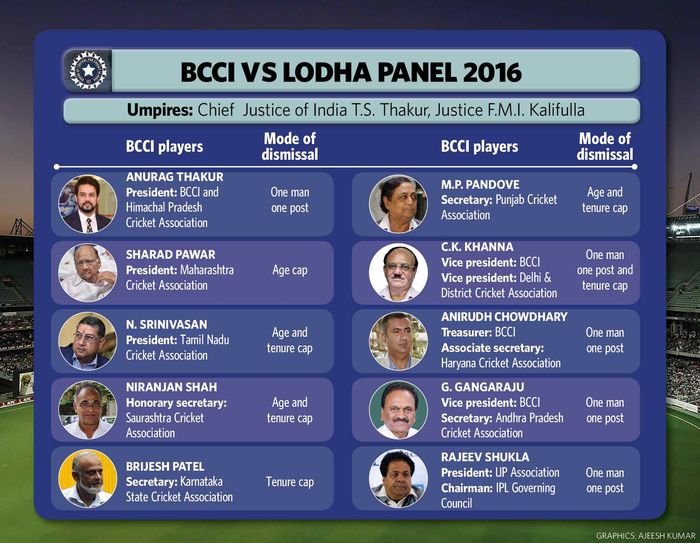Change or perish," said Chief Justice T.S. Thakur, while delivering the 143-page judgment that will change the Board of Control for Cricket in India. This brings to a close the two-year legal battle to reform the richest cricket body in the world. It also directly affects the two titans of Indian cricket administration: while Sharad Pawar stands to lose his position as president of the Mumbai Cricket Association, his rival N. Srinivasan's reign as the boss of the Tamil Nadu Cricket Association is over. The Supreme Court upheld all administrative and structural reforms recommended by the three member-panel chaired by Justice R.M. Lodha.
“The truth is that resistance to change stems partly from people used to the status quo, and partly because any change is perceived to affect their vested interests in terms of loss of ego, status, power or resources,” the chief justice said. The court has asked the Lodha Committee—other members are retired justices Ashok Bhan and R.V. Raveendran—to oversee the implementation. Deadline has been set at six months.

Nalini Chidambaram, counsel for Bihar Cricket Association, told THE WEEK: “I am very happy that the court has accepted all recommendations of the Lodha Committee, and, therefore, there will now be total administrative reform of the BCCI. Let us see how they will go about the implementation. We had requested that the Lodha Committee oversee this, and I am satisfied this was accepted.”
The court barred ministers and bureaucrats from becoming BCCI office bearers, capped maximum terms at three and upheld a cooling-off period after two terms. Crucially, the Supreme Court has insisted that the comptroller and auditor general be represented in the board and in state associations. The representative is expected to keep a check on all financial deals, including disbursement of money to member associations, players and vendors. The court has also cleared the formation of a players' body, which will be represented in the proposed nine-member apex council.
Sports activist and lawyer Rahul Mehra said, “The order on my public interest litigation against sports bodies, which included age and tenure caps, came in 2012. Cleansing happened in all sports. BCCI was the only sports body left. The rest are far ahead as far as reforms are concerned. Therefore, this judgment is important. However, some clarity is required on the electoral college and leaving the RTI issue to Parliament. The political class will never do it.”
BCCI members have been barred from membership in other sports bodies. And, the one-man-one-post rule has hit most sitting BCCI office bearers. President Anurag Thakur, who was elected in May, will have to relinquish his posts as president of the Himachal Pradesh Cricket Association and vice-president of the Indian Olympic Association. Secretary Ajay Shirke will step down as president of Maharashtra Cricket Association.
The grey area in the judgement is about how it will affect state associations. State associations are already asking if the Lodha Committee's suggestions on structure are binding on them. It has always been alleged that nepotism, corruption, mismanagement and poor administration run deep in the states.
The fiercely contested one-state-one-vote stipulation was upheld by the court. So, full members like Cricket Club of India, National Cricket Club, Railways and Services will lose their voting right and become associate members. States like Maharashtra and Gujarat, who have three full members in the BCCI, will now cast their vote by rotation.
The bigger challenge is to free state units from the stranglehold of individuals and families. The proxy voting system prevalent in associations like Delhi, Gujarat, Saurashtra and Haryana has allowed uninterrupted rule of individuals for decades.
“All state associations will resist changes," said Mehra. "But, what is good for the parent body will be good for the subsidiary body is the principle that should be followed.”
A source, privy to the Lodha Committee's interpretation, clarified: “The order applies to all, regardless of the type of incorporation of the bodies. The Lodha Committee report has clearly outlined eight or nine parameters, with which the BCCI and affiliates must comply. Full members of the BCCI will be those which abide by these rules. One of them is no more proxy voting. If a state association has proxy voting, then a complying association from the state will be granted full membership.” The order comes into effect immediately and will impact elections to the Karnataka Cricket Association, scheduled for August 7.
The chief justice closed his judgement by saying, “Whether the BCCI will change or not, whether it will be good or bad, we do not know. Future generations will judge.”






